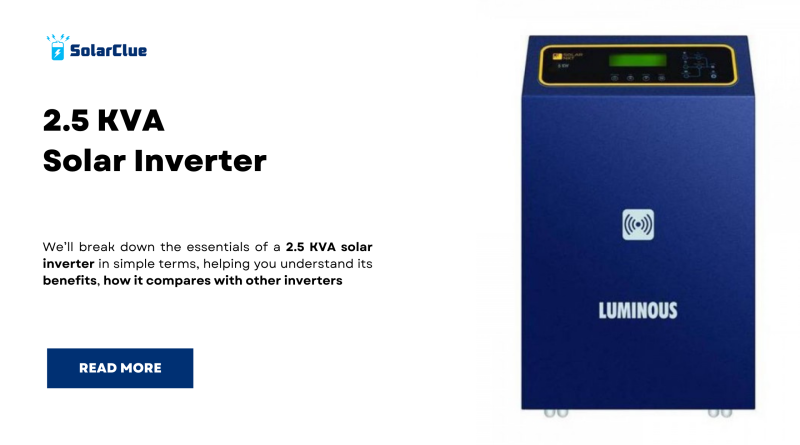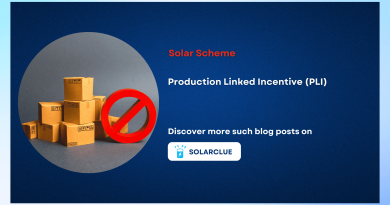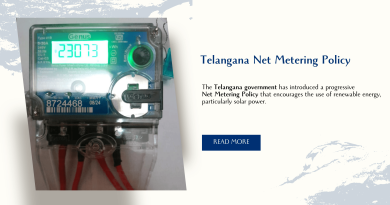2.5 KVA Solar Inverter
Thinking about going solar? One of the crucial components you’ll need to understand is the inverter. Specifically, the 2.5 KVA solar inverter. But what exactly is a 2.5 KVA solar inverter, and why is it important for your solar power system? In this guide, we’ll break down the essentials of this in simple terms, helping you understand its benefits, how it compares with other inverters, and why it might be the right choice for your needs.
Table of Contents
What is a 2.5 KVA Solar Inverter?
To put it simply, a 2.5 KVA solar inverter is a device that converts the direct current (DC) electricity generated by your solar panels into alternating current (AC) electricity, which is what most household appliances use. The term “2.5 KVA” refers to the inverter’s power capacity. KVA stands for kilo-volt-amperes, a unit used to measure the apparent power of the inverter.
Inverter capacity is crucial because it determines how much power the inverter can handle and supply to your home. So, a 2.5 KVA inverter can manage up to 2.5 kilovolt-amperes of power, making it suitable for small to medium-sized solar power systems.
Why Choose a 2.5 KVA Solar Inverter?
1. Appropriate for Small to Medium Homes
If you live in a small to medium-sized home or apartment, a 2.5 KVA solar inverter can be just right. It can handle the power needs of common household appliances like lights, refrigerators, and fans, making it a suitable choice for residential use.
2. Cost-Effective
Compared to larger inverters, a 2.5 KVA inverter is usually more affordable. If your power needs fall within this range, opting for this size can be a cost-effective way to start your solar journey without overspending.
3. Energy Efficiency
A properly sized inverter ensures that you’re not wasting energy. If your inverter is too large for your system, you might end up with inefficiencies. A 2.5 KVA inverter, when matched with your solar panel setup, provides optimal energy conversion with minimal wastage.
How Does a 2.5 KVA Solar Inverter Compare to Other Inverter Sizes?
Here’s a comparison to give you a clearer picture of how a 2.5 KVA inverter stacks up against other common inverter sizes:
| Inverter Size | Power Capacity | Suitable For | Approximate Appliance Coverage |
|---|---|---|---|
| 1 KVA | 1 KVA | Small apartments or cabins | Basic appliances like lights and small fans |
| 2.5 KVA | 2.5 KVA | Small to medium homes | Lights, refrigerators, fans, and small appliances |
| 5 KVA | 5 KVA | Medium to large homes | More appliances, including larger refrigerators and air conditioners |
| 10 KVA | 10 KVA | Larger homes or small businesses | Multiple large appliances, heavy-duty equipment |
From the table, you can see that a 2.5 KVA inverter is a good middle-ground option. It’s ideal for typical residential needs without being overly large or expensive.
Benefits of a 2.5 KVA Solar Inverter
1. Efficient Power Conversion
A 2.5 KVA inverter efficiently converts the DC power from your solar panels into AC power. This efficiency ensures that you’re getting the most out of the electricity your solar panels produce.
2. Scalability
If you plan to expand your solar system in the future, starting with a 2.5 KVA inverter gives you a solid foundation. You can always add more panels or batteries to your system later if your power needs increase.
3. Reliability
With a reputable brand, It provides reliable performance and durability. This reliability ensures that your solar system operates smoothly and continues to meet your power needs over time.
Installation and Maintenance Tips
1. Professional Installation
For the best performance and safety, have your 2.5 KVA solar inverter installed by a professional. They can ensure that it’s connected correctly to your solar panels and your home’s electrical system.
2. Regular Maintenance
Keep your inverter clean and free of dust. Regularly check for any error messages or warning lights on the inverter display. This helps catch any potential issues early and ensures that your system continues to run efficiently.
3. Monitor Performance
Many solar inverters come with monitoring systems that allow you to track their performance. Use these tools to keep an eye on how much energy your system is generating and consuming. This information can help you optimize your energy use and detect any problems.
Common Misconceptions
1. “A Bigger Inverter is Always Better”
Not necessarily. A larger inverter might seem like it would provide more power, but it’s important to match the inverter size with your actual power needs. A 2.5 KVA inverter is suitable for many homes and ensures that you’re not overspending on an oversized unit.
2. “Inverters Don’t Need Maintenance”
While solar inverters are generally low-maintenance, they still require some care. Regular checks and proper cleaning can help extend the life of your inverter and keep your solar system running smoothly.
Conclusion
2.5 KVA solar inverter is a versatile and practical choice for many residential solar systems. It offers a balanced capacity that can handle the power needs of small to medium-sized homes efficiently. By understanding the benefits, installation tips, and maintenance requirements, you can make an informed decision about whether this inverter size is right for your solar setup.
Going solar is an exciting step toward energy independence and sustainability. With the right equipment, like a solar inverter, you can ensure that your solar power system runs smoothly and efficiently, providing you with reliable power for years to come. So, if you’re considering making the switch to solar, a 2.5 KVA inverter might be just what you need to get started.
Visit SolarClue® to see the best Solar Inverters. SolarClue® actively sells solar energy products at discounts of up to 50% on its online marketplace.
FAQs
1. What appliances can a 2.5 KVA solar inverter run?
It can power a range of household appliances including lights, refrigerators, fans, and small electronics. However, it may not be sufficient for heavy-duty appliances like large air conditioners or multiple large appliances running simultaneously.
2. How long does a 2.5 KVA inverter last?
With proper maintenance, This inverter typically lasts between 5 to 10 years. The lifespan can vary based on factors like usage, quality of the inverter, and environmental conditions.
3. Can I upgrade my inverter later?
Yes, you can upgrade your inverter if your power needs increase or if you decide to expand your solar system. However, make sure to consult with a professional to ensure compatibility with your existing solar setup.
4. How do I choose the right inverter size for my home?
Consider your total power consumption and the size of your solar panel system. A 2.5 KVA inverter is a good choice for small to medium-sized homes, but if you have higher energy demands or larger appliances, you might need a larger inverter.



